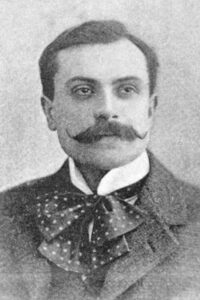
The Golden Face, A Great ‘Crook’ Romance
When I, George Hargreaves, came out of the Army after the Armistice, I found myself, like many hundreds of other ex-officers, entirely at a loose end, without a shilling in the world over and above the gratuity of between two and three hundred pounds to which my period of commissioned service entitled me.
Grown accustomed during the war, however, to fending for myself and overcoming difficulties and problems of one sort or another, I at once set to work to look for any kind of employment for which I fancied I might be fitted. After answering many advertisements for no purpose, I one day happened upon one in The Times that rather stirred my curiosity.
It stated that a gentleman in a good position who had to travel to many parts of the world would like to hear from a young man with considerable experience in motor driving. The applicant should not be over thirty, and he needs to be a gentleman and well-educated, with a knowledge of foreign languages if possible; also, he should be trustworthy and possess initiative. The salary would be very liberal.
The application was to be made by letter only to a specific box at the office of The Times.
I wrote at once and received some days later a reply signed “per pro-Rudolph Rayne,” asking me to call to see the advertiser, who said he would be awaiting me at a certain small hôtel-de-luxe in the West End at three o’clock on the following afternoon.
I arrived at the highly aristocratic hotel at five minutes to three. I was conducted to a private sitting room by a page which, on ushering me in, indicated a good-looking, middle-aged man seated near the window, reading a newspaper and smoking a cigar.
The gentleman looked up as I approached, then put down his paper, rose, and extended his hand.
“Mr. George Hargreave?” he inquired in a pleasant voice.
“Yes. Mr. Rudolph Rayne, I presume?”
He bowed and pointed to a chair close to his own. Then he sat down again, and I followed his example.
Read or download Book
William Le Queux
William Tufnell Le Queux (2 July 1864 – 13 October 1927) was an Anglo-French journalist and writer. He was also a diplomat (honorary consul for San Marino), a traveler (in Europe, the Balkans, and North Africa), a flying buff who officiated at the first British air meeting at Doncaster in 1909, and a wireless pioneer who broadcast music from his station long before radio was generally available; his claims regarding his abilities and exploits, however, were usually exaggerated. His best-known works are the anti-French and anti-Russian invasion fantasy The Great War in England in 1897 (1894) and the anti-German invasion fantasy The Invasion of 1910 (1906), the latter becoming a bestseller.
Early life
Le Queux was born in London. His father was a French draper’s assistant and his mother was English. He was educated in Europe and studied art under Ignazio (or Ignace) Spiridon in Paris. He carried out a foot tour of Europe as a young man before supporting himself by writing for French newspapers. In the late 1880s, he returned to London where he edited the magazines Gossip and Piccadilly before joining the staff of The Globe as a parliamentary reporter in 1891. In 1893 he abandoned journalism to concentrate on writing and travelling. His partial French ancestry did not prevent him from depicting France and the French as the villains in works of the 1890s, though later he assigned this role to Germany.
Career
Le Queux mainly wrote in the genres of Romance, mystery, thriller, and espionage, particularly in the years leading up to World War I, when his partnership with British publishing magnate Lord Northcliffe led to the serialized publication and intensive publicizing (including actors dressed as German soldiers walking along Regent Street) of pulp-fiction spy stories and invasion literature such as The Invasion of 1910, The Poisoned Bullet, and Spies of the Kaiser. These works were a common phenomenon in pre-World War I Europe, involving fictionalized stories of possible invasion or infiltration by foreign powers; Le Queux’s specialty, much appreciated by Northcliffe, was the German invasion of Britain. He was also the original editor of Lord Northcliffe’s War of the Nations.






